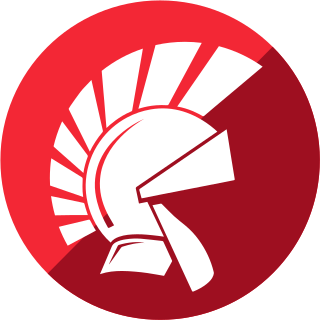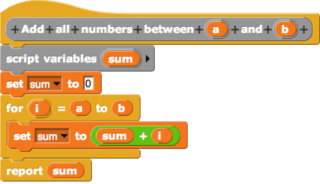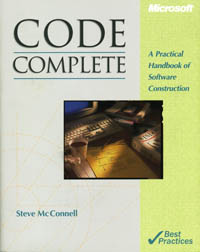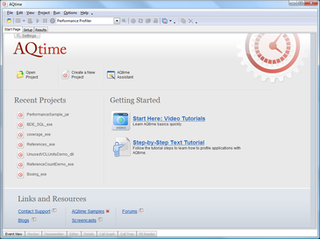An integrated development environment (IDE) is a software application that provides comprehensive facilities to computer programmers for software development. An IDE normally consists of at least a source code editor, build automation tools, and a debugger. Some IDEs, such as NetBeans and Eclipse, contain the necessary compiler, interpreter, or both; others, such as SharpDevelop and Lazarus, do not.
In computing, cross-platform software is computer software that is designed to work in several computing platforms. Some cross-platform software requires a separate build for each platform, but some can be directly run on any platform without special preparation, being written in an interpreted language or compiled to portable bytecode for which the interpreters or run-time packages are common or standard components of all supported platforms.
A computing platform or digital platform is an environment in which a piece of software is executed. It may be the hardware or the operating system (OS), even a web browser and associated application programming interfaces, or other underlying software, as long as the program code is executed with it. Computing platforms have different abstraction levels, including a computer architecture, an OS, or runtime libraries. A computing platform is the stage on which computer programs can run.

OpenDoc is a defunct multi-platform software componentry framework standard created by Apple in the 1990s for compound documents, intended as an alternative to Microsoft's proprietary Object Linking and Embedding (OLE). It is one of Apple's earliest experiments with open standards and collaborative development methods with other companies. OpenDoc development was transferred to the non-profit Component Integration Laboratories, Inc., owned by a growing team of major corporate backers and effectively starting an industry consortium. In 1992, the AIM alliance launched between Apple, IBM, and Motorola—with OpenDoc as a foundation. With the return of Steve Jobs to Apple, OpenDoc was discontinued in March 1997.

Delphi is a general-purpose programming language and a software product that uses the Delphi dialect of the Object Pascal programming language and provides an integrated development environment (IDE) for rapid application development of desktop, mobile, web, and console software, currently developed and maintained by Embarcadero Technologies.
Test-driven development (TDD) is a software development process relying on software requirements being converted to test cases before software is fully developed, and tracking all software development by repeatedly testing the software against all test cases. This is as opposed to software being developed first and test cases created later.

In computing, a visual programming language or block coding is a programming language that lets users create programs by manipulating program elements graphically rather than by specifying them textually. A VPL allows programming with visual expressions, spatial arrangements of text and graphic symbols, used either as elements of syntax or secondary notation. For example, many VPLs are based on the idea of "boxes and arrows", where boxes or other screen objects are treated as entities, connected by arrows, lines or arcs which represent relations.

Macintosh Programmer's Workshop (MPW) is a software development environment for the Classic Mac OS operating system, written by Apple Computer. For Macintosh developers, it was one of the primary tools for building applications for System 7.x and Mac OS 8.x and 9.x. Initially MPW was available for purchase as part of Apple's professional developers program, but Apple made it a free download after it was superseded by CodeWarrior. On Mac OS X it was replaced by the Project Builder IDE, which eventually became Xcode.
CodeWarrior is an integrated development environment (IDE) published by NXP Semiconductors for editing, compiling, and debugging software for several microcontrollers and microprocessors and digital signal controllers used in embedded systems.

Code Complete is a software development book, written by Steve McConnell and published in 1993 by Microsoft Press, encouraging developers to continue past code-and-fix programming and the big design up front and waterfall models. It is also a compendium of software construction techniques, which include techniques from naming variables to deciding when to write a subroutine.
Bruce "Tog" Tognazzini is an American usability consultant and designer. He is a partner in the Nielsen Norman Group, which specializes in human-computer interaction. He was with Apple Computer for fourteen years, then with Sun Microsystems for four years, then WebMD for another four years.
Steve Capps is an American computer programmer, who was one of the designers of the original Apple Macintosh computer.
Mac gaming refers to the use of video games on Macintosh personal computers. In the 1990s, Apple computers did not attract the same level of video game development as Microsoft Windows computers due to the high popularity of Microsoft Windows and, for 3D gaming, Microsoft's DirectX technology. In recent years, the introduction of Mac OS X and support for Intel processors has eased porting of many games, including 3D games through use of OpenGL and more recently Apple's own Metal API. Virtualization technology and Boot Camp also permit the use of Windows and its games on Macintosh computers. Today, a growing number of popular games run natively on macOS, though as of early 2019, a majority still require the use of Microsoft Windows.
Incredibuild is a suite of grid computing software developed by Incredibuild Ltd. Incredibuild's mission is to help accelerate computationally-intensive tasks by distributing them over the network, with notable applications including compiling source code, building software generally, and other software development–related tasks. Jobs can be distributed to several computers over a network, giving both the possibility of accelerating the work by using more resources than were available on the initiating computer alone and potentially freeing local resources for other tasks.

TestComplete is a functional automated testing platform developed by SmartBear Software. TestComplete gives testers the ability to create automated tests for Microsoft Windows, Web, Android, and iOS applications. Tests can be recorded, scripted or manually created with keyword driven operations and used for automated playback and error logging.

AQtime is a performance profiler and memory/resource debugging toolset developed by SmartBear Software. It is integrated into Microsoft Visual Studio, Visual Studio Test Projects and Embarcadero RAD Studio that allows analyzing the application without leaving the development environment.
This outline is an overview of software and a topical guide in list form.

Visual Studio Code, also commonly referred to as VS Code, is a source-code editor made by Microsoft with the Electron Framework, for Windows, Linux and macOS. Features include support for debugging, syntax highlighting, intelligent code completion, snippets, code refactoring, and embedded Git. Users can change the theme, keyboard shortcuts, preferences, and install extensions that add functionality.






